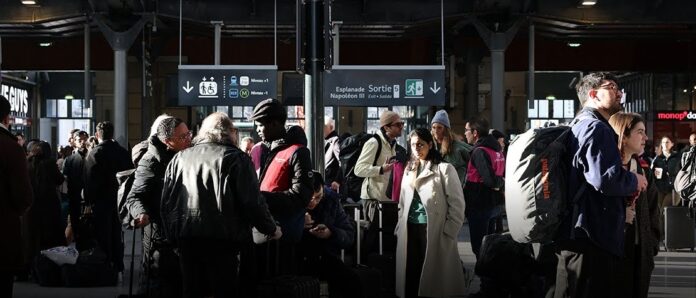A massive WWII bomb near Paris’ busiest station triggered mass evacuations and total transport chaos
A Second World War bomb buried beneath rail tracks near Paris unleashed chaos on Friday, paralysing transport, forcing evacuations, and leaving thousands stranded. Discovered just 1.5 miles from Gare du Nord—the French capital’s busiest railway terminal—the 500kg device ground Eurostar services to a halt, closed major roads, and sent shockwaves through local communities.
Rail maintenance workers stumbled upon the unexploded bomb in the early hours, buried two metres underground. The discovery immediately set off a large-scale security operation, with police expanding the exclusion zone to one kilometre. Authorities wasted no time, evacuating residents whose windows faced the site and locking down six nearby schools and a care home.
Commuters were caught in the chaos as all trains to and from Gare du Nord—serving 700,000 people daily—came to an abrupt stop. Eurostar passengers faced mass cancellations, with the company urging travellers to rebook their journeys for another day. Many were stranded at London’s St Pancras station, frustrated and unsure of when they’d reach their destinations.
French police worked tirelessly to neutralise the device, which contained a staggering 200kg of explosives. The delicate operation lasted all day, with disposal teams carefully defusing the bomb by 5pm local time. Transport Minister Philippe Tabarot assured the public that all procedures had been followed meticulously, emphasising there was “nothing to fear” but caution was necessary.
Authorities are unsure when or by whom the bomb was dropped, with speculation it may date back to the wartime bombings of northern Paris, an area heavily targeted due to its rail infrastructure and factories. SNCF rail network chief Matthieu Chabanel called the discovery “exceptional” but admitted such risks exist when working in historically bombed areas.
The operation caused a ripple effect across northern France. Some regional trains were rerouted through Gare de Lyon, while passengers needing to reach Charles de Gaulle airport were forced to take buses from Opéra. High-speed services to Belgium and the Netherlands ran as usual, but all direct trains between Paris and London were cancelled.
As the defusal process concluded, the bomb’s impact remained visible: disrupted travel, frustrated passengers, and a reminder of the lingering dangers buried beneath Europe’s cities.
THE INDEPENDENT
Thousands of Eurostar passengers face disruption after a World War II bomb was found near Paris Gare du Nord, forcing all London-Paris trains to be cancelled. With 25,000 travellers affected on Eurostar’s busiest day, rebooking may prove difficult.
Eurostar is offering free exchanges, but unlike airline passengers, rail travellers have limited rights. The company will not reimburse alternative transport costs, though passengers can claim a refund for unused tickets. Those stranded may receive compensation for hotel stays, typically capped at £150 per night.
Flights between London and Paris are mostly full, meaning passengers may need to consider alternative routes via other UK or French cities. Travel insurance might cover some expenses. Eurostar has yet to confirm if additional services will be scheduled to clear the backlog.
SKY NEWS
A 453kg WWII bomb found near Paris Gare du Nord caused major disruption, forcing the cancellation of all 32 London-Paris Eurostar trains on Friday. Bomb disposal experts safely defused the device, allowing services to resume on Saturday with two extra trains added.
The discovery led to widespread chaos, with nearly 500 trains cancelled and 600,000 people affected in Paris. Roads and local rail services were also disrupted as police evacuated 200 people. Passengers were offered free ticket exchanges or refunds but no compensation.
French authorities say unexploded wartime bombs remain a persistent issue, though rarely in such a busy area. Eurostar apologised for the disruption, while travellers scrambled for alternative routes. Normal service is expected to resume, easing the travel backlog.
